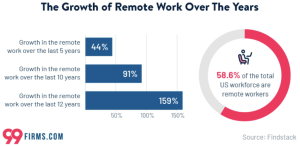If evidence were needed that we really are in a global economy, where talent no longer needs to live within a 20 mile radius of where an organization is located, then recent data from The Conference Board should make CHROs take notice.
If finds American organizations are now more willing to hire remote workers from anywhere in the US (26%) or abroad (10%) – and this was according to speaking to 300 HR executives from mainly large US companies. Some 88% are now open to hiring remote workers – up from 52% pre-pandemic.
But if ‘intent’ to hire more remote workers is largely the legacy of Covid-19, turning it into action can still be a problem.
For while the lure of being able to find the perfect person halfway around the globe is enticing for recruiters, the practicalities of this can still feel daunting. This is all due to wildly different tax regimes; local working regulations requirements and even payment protocols and complications around visas etc.
The HR industry being what it is though, means providers have (of course), emerged primarily to help make this easier, and leading the pack is Oyster.
This relative new kid on the block (it is just four years old), is already a B Corp-certified Unicorn and is on a mission to create a more equal world by making it easier for companies to hire, pay, and care for talent, regardless of their location.
In September, it raised $59M in Series D funding, and it has already established a suite of key products, including Global Payroll and Visa Sponsorships which help simplify operations and support borderless teams. Also provided is Salary Insights, a tool that gives fair compensation recommendations for domestic and international employees. Its Oyster Embedded solution meanwhile is Oyster’s first no-code offering that enables organizations to offer global hiring, payroll, and rewards right within their own product.
But arguably best of all – this is a company that literally practices what it preaches: some 40% of its own staff are itself located in abroad, and in emerging markets.
It’s not surprising really. Oyster was founded by serial entrepreneur Tony Jamous (below) – who in building up his own previous companies, quickly realized the benefit of having lots of remote workers.
“It was while being an entrepreneur that I realized the power of hiring people from all over the world,” says Jamous – who was himself once a refugee from Lebanon, and was previously the CEO of CPaaS provider, Nexmo (now Vonage).

Speaking exclusively to TLNT, he says: “It was when I was thinking about how best to hire these people in other countries that I realized a solution was needed that made it as easy for employers to hire people globally as it was locally.”
According to Jamous, there are around 90 million knowledge worker jobs being unfulfilled – a number that could be considerably reduced if life was made easier for companies to employee people from the four points of the compass.
“Instead of companies have to beg people to join them, they can totally turn this around, and make it easy for workers to join them,” he asserts.
Emerging economies can compete too
As well as being driven to help US businesses recruit and employ people from all over the world, a clear mission Jamous has is to also give companies in emerging economies the ability to reach out into the global talent pool and hire people too – including folk from the US.
In this sense, he wants to give these companies the same access to the global talent pool as developed nations have.
“Last year alone, we helped put more than $100 million into emerging economies, and around 40% of our business is in emerging economies,” he says.
He adds: “I’m particularly proud of this latter fact, because it’s democratization that we create. We give all companies – wherever they are based – the power to be able to source talent from wherever they want it.”
Removing complexities created by humans
As one might imagine, building a company to do all this hasn’t been easy.
“We’ve done five-rounds of seed funding – money that’s mostly been needed to solve complex problems,” says Jamous.
He adds: “We’ve basically had to build software to remove the complexities created by humans! We – as a society – have created overly complicated taxation systems. We should stop creating complexity!”
Unfortunately, he observes, the rate of complexity “is only getting faster.” He says. “What we really need is a drive towards simplicity. That’s what we’re trying to do anyway.”
But is the outlook really so positive?

Several rounds of funding later appear to suggest that investors are confident that this is a good business to get into.
But, parallel to the trend for more global searching of talent, has also been a trend for companies to be more inward-looking and nationalistic in their nature, and also for staff (through RTO policies), to actually be in an office more, and not be remote anymore.
Does Jamous see both these trends as having an impact on hiring globally?
“My view that companies who force people to be back in the office will be the businesses that go out of business,” he asserts confidently.
“We’ve definitely seen nationalism, but again, I also think this will abate. The best talent now knows that they can work for the best companies anywhere, so talent will be driving things just as much – if not more – as organizations are. We’ve experience 700% growth in the last two years – which I think says something about the market.”
He adds: “We get 740 applications – from all over the world – for every role we advertise for people to join Oyster. That also shows just how global the labor market is. If we can help make things easier for HR, then that’s our job done.”
